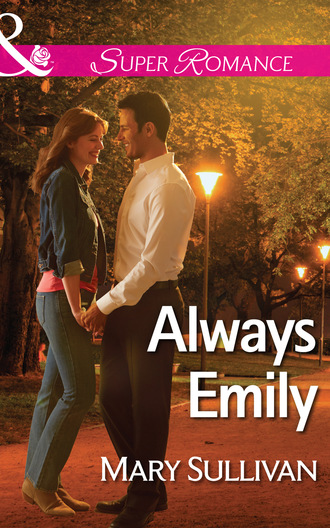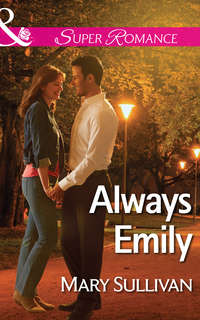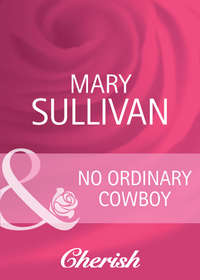
Полная версия
Always Emily
“Some people don’t need the whole world held up to them as a mirror. Some people do great things even while they are humble.”
“I don’t need to be humble. Nor should I be.”
“Please, Jean-Marc.” Her head pounded. “Be a better man than this. Leave while I finish packing. I don’t want to do this anymore.”
“I will ruin you.” There was something smug about his disgusting little smile, all sunshine gone now, proving as he often had that his ego was stronger than his love. He left the bedroom and, a moment later, the apartment door slammed shut behind him.
She double-checked that she hadn’t left anything behind then carried everything to the front door, but decided to use the washroom one last time before going. She wished her stomach would settle down. Those airport lineups could be brutally long and slow. Khartoum was a small airport by international standards, but busy. She was washing her hands when she thought she heard something in the living room.
“Hello?” She stepped out. No one. Just her imagination.
She reached for the doorknob to leave. The door stood open a fraction of an inch. It should have been shut tightly, especially because Jean-Marc had slammed it on his way out. Had it been closed when she put her bag here? She rubbed her forehead. She couldn’t remember.
She studied the small rooms. Nothing was amiss. She glanced at her knapsack and violin case. They looked fine. A thread of doubt ran up her spine and she opened her case. Jean-Marc would know where to hurt her most, by damaging her precious violin.
She checked every square inch of the instrument and found it sound, then packed it back into its case.
Her headache set off fireworks behind her eyes and she just wanted out—of the country and the relationship—so she shrugged off all thoughts of what that open door might mean. A shuffle in the building hallway alerted her. Someone was there. She threw open the door then let out a breath. Not Jean-Marc come back to wreak vengeance, thank goodness.
Instead, seven-year-old Maria Farouk, in all of her cosmopolitan beauty, compliments of an Egyptian father and an Italian mother, stared up at her with liquid brown eyes in an olive-skinned face. Her thick hair had been brushed to glossy perfection.
“Maria,” Emily said. “What are you doing in the hallway alone?”
“I came to say goodbye.” The child sounded too solemn. Of all of the farewells Emily had made in the past two days, this would be the most difficult.
Emily glanced toward Maria’s apartment. Her mother, Daniela, stood in her doorway making sure her child was safe alone in the corridor. When she saw Emily, she waved.
Emily leaned forward and cupped Maria’s face with her palms. “We became good friends, didn’t we?”
Maria nodded. “Can you send me postcards?”
It had become a game with them, that Emily would find the funniest cards in her travels and mail them to Maria. Also, because she’d loved the child so much, she had bought her a child-size violin and had taught her to play.
“Yes, lots of postcards,” she promised. “Will you practice your violin?” Maria had great talent, more than Emily would ever possess.
“Every single minute,” Maria shouted. Emily laughed and kissed her forehead.
“Not that much, little one. Make time for fun.” She made sure she had eye contact before saying from her heart, “I promise you this. When you grow up and become a famous violinist, I will come to your concerts.”
“You will come backstage,” Maria ordered. “I will give you a pass. You come say hello to me.”
“I will. I promise.” Emily had to leave right away because if she stayed, she would cry, and that would sadden Maria. “In the meantime, I’ll send you a postcard of a bear from Colorado.” From home. Her longing overcame the sadness of leaving. She wanted home. Her family. Peace and quiet.
Maria returned to her apartment. Emily watched until she was safely inside. Despite the clean break, bits of Emily would linger behind, with Maria, with her friends Penelope Chadwick and Les Reed, and with her impassioned colleagues. She had enjoyed her time with them all.
But Jean-Marc? That connection was gone for good, severed as cleanly as though she’d taken an amazon’s sword to it. If not for the sweat seething from her pores, she would be on top of the world. Free at last.
Only one more goodbye left. She went down to the second floor of the apartment building in which all of the archeologists lived. Penny answered the door when she knocked.
Jean-Marc used to call Penelope Chadwick the Horse. Yes, she had a long face and those endless legs, but also a bosom most women envied.
Her smile eased some of Emily’s apprehension. Penny, in her oversize T-shirts and baggy trousers, with her manly tramping about the toughest terrain on her muscled athletic legs, had been a dear friend, and Emily loved her every capable, unfeminine, not-too-attractive molecule.
Penny was one of the good people.
Behind Penny, Les Reed, her compatriot and lover, touched Penny’s elbow, the movement a subtle sign of possession and pride.
Where Penny was tall, Les was short and rotund. When Penny held Les, her ample breasts would flank his face. Emily wondered if he ever felt smothered. Judging by his satisfied grin, he would die a happy man.
She loved these people. She loved their honesty, loyalty and boundless integrity. Why couldn’t everyone in the world be like them?
She fell into Penny’s enveloping embrace. “I will miss you so much.” Her sinuses ached. Why wasn’t life easier? Why couldn’t she carry her friends with her in her pockets, wherever she went, and take them out when she needed them? “I’ll write often.”
“You’ll visit us in England when we’re at home.” From Penny, it came out as order rather than an invitation.
“Yes,” Emily promised. “I will.”
After copious hugs and kisses with both Penny and Les, and a too-brief goodbye, Emily was on her way to her new life.
Fifty minutes later, she stood at the airport in a lineup that moved with glacial slowness toward security.
At last second in line, she put her violin case onto the conveyor belt that would carry it through the X-ray machine.
Sweat poured from her face and a pair of Japanese Kodo drummers hammered her temples in unrelenting waves. This had nothing to do with the heat of the desert. She was sick. Some kind of flu. Rotten timing.
Suck it up, kid. Nothing would hold her back from getting on that plane.
Unsnapping the buckles on her knapsack, she reached inside for her cosmetic bag, where she kept cotton hankies. Her hand touched something unexpected, something she hadn’t packed, and she froze.
Whatever the object was, she hadn’t put it there. She peeked inside, keeping her actions unobtrusive. In her palm, she held a tiny ancient prayer book. She’d seen it before. On their dig. It was supposed to be under lock and key at the National Museum of Sudan, where every artifact they unearthed eventually found a home. So what was it doing in her bag?
She dropped it back into the knapsack, but a tiny gasp betrayed her. Despite how insignificant that intake of breath, it drew the guard’s attention. He approached.
Damn, damn, damn.
Her mouth dried up like the Sahara. Too late to turn and leave. If she took her bag and violin from the belt, he would know something was up and would detain her. One way or another, her bag would be searched today.
The penalty for smuggling artifacts out of the country was jail time. No questions asked. No leniency. No compassion. Too much had been stolen from these civilizations over the centuries. They’d been robbed blind.
If she denied ownership, they would think she was lying. If she tried to tell them she’d been set up, they would think she was lying.
There was no good outcome here. She was the most screwed piece of metaphorical toast on the face of the planet, and she knew whom to blame.
Jean-Marc. Her open apartment door. He’d retrieved the relic from his apartment down the hall and then had slipped back into her place long enough to stash it in her things so she would be caught with it as she left the country. Vindictive piece of decrepit crap.
I will ruin you. Yes, he had.
Rage filled her, and not just because of what he was doing to her, but because this precious article shouldn’t have been in his possession. Why was it, damn him?
The day she let Jean-Marc win was the day she rolled over and died. She had to get out of this airport and get the relic back where it belonged, with the people of the Sudan.
Think. Think!
What could she do?
Sweat dripping from her forehead burned her eyes. She grasped the hankie in her hand and ran it over her face. The man in front of her in the lineup hadn’t bathed recently, and the smell made her ill.
“Is something wrong, miss?” the guard asked, tone solicitous but eyes hard. “Are you nervous about your flight?”
She shook her head. “Sick.”
His brow furrowed. “If you are sick, you cannot fly.”
“Have to. Need to get home.” She wasn’t thinking clearly. The fever was messing with her brain. She had to get out of the airport, not onto a plane.
Her violin case and bag crept along the belt closer to the X-ray machine. They would question the prayer book. It wasn’t shaped like a paperback novel. It was flat and small—and oh so ancient and precious. She reached to take it back. The guard stopped her.
They would find the relic and send her to the closest prison, where she would rot for years. Nothing and no one would be able to help her. The thought turned her stomach.
And wasn’t that fortunate? She was desperate enough to try anything.
She glanced at the guard’s immaculate uniform and her reflection in the glossy surface of his spit-shined brown shoes. Vanity, you just might be my saving grace.
This past winter, she’d had a cold that had left her with a cough that wouldn’t quit. One day, it had been so bad she’d coughed so hard, she had ended up losing her breakfast.
The bag slid closer to the machine. The belt stopped abruptly. They questioned the man in front of her about an item in his carry-on luggage.
She took advantage of the lull and started to cough, covering her mouth with the hankie. She coughed harder, contracting her muscles to get them to obey.
Given the heat of the day, the unnatural fever and the sour scent of the man in front of her, it didn’t take much to get her stomach to cooperate.
Her breakfast rose into her mouth and—oops—her hankie slipped away from her lips. She vomited on the floor, leaning forward enough that she also hit the guard’s shoes.
“Hey!” he yelled and swore in Arabic.
Another guard joined them. “What’s wrong here?”
“She’s sick,” the first guard spat. “Disgusting.”
Good. Maybe they would let her turn around and walk out of here. She could get the relic back to where it belonged.
Her mouth tasted like hell. “Maybe I should return to my apartment and take a later flight.” She held her breath, willing the man to agree. He ignored her as though she were a gnat.
“Clean this up,” the second guard called to a janitor. Pointing at her, he said, “You come with us.”
Oh crap, oh crap. He took her past security to the offices. Scrap that thought. They were headed to a private interrogation room. She was in deep trouble.
The first guard had retrieved her knapsack and her violin case from the belt and carried them into the room. He dropped them onto the table and she reacted before she could think, yelling, “Hey, be careful. That violin is old.”
He paid no heed while the second guard took his time checking her passport and documents. “Why did you think you would be able to fly while you are so ill? Did you not consider the other passengers? They would not want to get sick.”
She wouldn’t lose her cool. There had to be a way out of this. “I didn’t feel this ill when I left my apartment. It came on suddenly.”
A firm knock sounded on the door.
“Come,” one of the men said.
A man Emily recognized stepped into the room—tall, handsome Dr. Damiri. Everyone on the dig used his services when they were ill. “Doctor! What are you doing here?”
“More to the point,” he said in his soft, sensible voice, “what are you doing here? I was in another lineup and saw you get ill.”
He turned to the guards and handed them his identification. “I am her doctor. May I check her out?”
The first guard scowled, but the second returned Damiri’s ID. “It’s okay. I know him. He is my sister’s doctor.”
Dr. Damiri felt Emily’s forehead. “High fever,” he murmured. He examined her throat, pressed on her stomach and asked endless questions, at the end of which, he pronounced, “Malaria.”
“What?” She hiccupped a tiny sob, playing the pity card, willing to do whatever it took to save her skin. Maybe they would let her go through without checking her bag. “But I just want to go home.”
To the guards, the doctor said, “It isn’t infectious. She can fly.”
To Emily, he instructed, “It won’t be a comfortable trip home, but you can make it. You will have fever. Chills. Great fatigue.” He smiled gently. “Maybe more vomiting.”
“My brain wants to pound out of my skull.”
“Yes, headache, too.” He wrote on a pad of paper he pulled from his briefcase. “In my estimation, you have uncomplicated malaria. There’s nothing you can do but ride it out. In America, go to your doctor and get a prescription for this medication and take it to prevent a reoccurrence.”
“That’s it?”
“Yes. That’s all you can do.” He handed her a small vial of pills. “Take these.”
“What are they?”
“Anti-nausea tablets. I always carry them when I fly, but you need them today more than I do.”
With a wink, he was gone and she was alone with two unhappy guards and a stolen artifact in her luggage.
Emily stood, her brain so foggy she didn’t know whether to come or go. “I can return to my apartment and get better, and then take a different flight another day.”
For the second time, the guards ignored her suggestion.
“The doctor has cleared you to fly. You will go today.” He reached for her bag. No!
She retrieved her cosmetic bag, leaning close to breathe in his face. “I vomited. I have to brush my teeth before I get on the flight.”
Screwing up his nose, he waved her away.
In the washroom, she entered a stall and locked the door. The washroom might have cameras, but the stalls wouldn’t. After she pulled the prayer book out of the bag, she took a moment to examine it, a little beauty in good condition. The papyrus had yellowed with age and the tiny paintings had faded, but it had obviously been cared for and well-loved by its owner.
She dumped her small toiletry bottles out of the zipped plastic bag she’d stored them in, put the book into it, secured the edges together and stuffed it into her bra, protecting it from the sweat of her fever.
After using the toilet, she washed her hands and made a show of brushing her teeth carefully, because she needed to, but also in case they watched her. She chewed a mint from her makeup kit.
Back in the room, the guards had emptied her bags and were searching every object, every item of clothing. Shivering, she picked up a pashmina she’d bought on her travels and wrapped it around her throat, dropping the ends to cover the slight bulge in her bra.
Thanks to Dr. Damiri’s list of symptoms, they wouldn’t find her behavior suspicious. She hoped.
One of the guards took her makeup bag and searched it. The other left the room, presumably to search the bathroom. When he came back, he gave the guard a surreptitious shake of his head.
She was allowed to repack her belongings, while feeling an inexorable sense of losing control. Not for long. She would fix this. Somehow.
They led her to the departure lounge and left her there. This was too wrong. Taking an artifact out of its native country, out of its home, went against every ethic, every part of her moral code.
Nausea rose into her throat, and she took one of Dr. Damiri’s pills.
She had no choice but to leave. At the moment, self-preservation was more important than ethics. And didn’t that suck? The prayer book belonged here, not thousands of miles away in Colorado.
Jean-Marc had known exactly what he was doing. Her rat of an ex-boyfriend had ruined her plan for a clean break. The prayer book tied her to him.
An hour later, she was on the first of many flights that would take her home, curled under a blanket with chills that had nothing to do with inflight air-conditioning, and everything to do with a smuggled artifact burning a hole in her chest wall, so far up shit creek without a paddle she wasn’t sure how she would recover.
CHAPTER TWO
EMILY CAME HOME to Accord angry, railing against men and their perfidy, and scared.
She’d returned to answer the toughest questions of her life—who was Emily Jordan? Who had she allowed herself to become? And how did she find her way back to being a better person?
And what on earth was she going to do with the rest of her life?
The hand she ran across her forehead came away damp. She’d been sweating for three days. The fever had to break soon.
She stood in front of her father’s house. Another year come and gone and nothing to show for it. She didn’t even have her own home.
She wrapped her arms around her violin, pressing the case hard against her breastbone, anything to stop the shudders that wracked her body.
Cars lined the long driveway to her dad’s house, a white sanctuary in a sea of green conifers, lit up like a birthday cake. As it should be. Today was his birthday—the big five-O—and she didn’t even have a birthday present for him. Was I always this self-centered? Then again, she was sick and had other things on her mind.
Where were the years going? How did her father get to be fifty already? How could Emily herself possibly be thirty-one, and what did she have to show for it?
At her age, her dad had been a parent for twelve years, had already made his first few million and had owned a big house in Seattle.
Emily had the knapsack on her back, the violin she clutched to her chest like a treasured doll and a career as an archaeologist she would never pursue again.
She’d left the dry, dusty heat of the Sudan behind as though she were a mummy shedding her wrappings, one difficult twist at a time.
Too bad it felt as if those wrappings still clung to her, like a ribbon stretching between Colorado and the Middle East, sticking to her pores like the sand of the desert during a windstorm.
She imagined one long thread of decaying but tough fabric winding its way across the earth from her to Jean-Marc. With that one artifact he’d hidden in her bag, he’d bound her to him.
“Get lost,” she whispered to the mummy wrapping. It didn’t listen. Resigned to that tug toward a man and a part of the world she had rejected, she opened the front door and stepped into a wall of sound, light and warmth, of conviviality and happiness—the most beautiful, welcoming homecoming she could imagine. And it felt all wrong.
Oh, the things she’d done. She didn’t deserve these people.
“Emily!” The voice belonged to Laura, who rushed down the hall toward her with arms spread wide. If Dad was fifty, that made Laura fifty-three. Wasn’t it a crime for a woman her age to look so good when Emily felt like crap?
Laura had a body men drooled over, albeit a little thicker around the middle than it used to be. Her chestnut hair, threaded now with silver but still thick, fell past her shoulders and framed a face with a few more wrinkles.
A crocheted sweater fell off one shoulder, revealing freckles that dotted pale skin, and a filmy flowered skirt floated around her ankles. Earth mother.
“Nick!” Laura called toward the kitchen. “Our girl is home!”
Enveloping Emily in a hug, she cloaked her in a cloud of patchouli and incense, the scent so familiar and dear it brought Emily to the edge of control.
She’d been awful to Laura when she’d first met her, a twelve-year-old witch who’d wanted her father all to herself, but Laura had persevered in creating a lasting friendship. Thank God.
Emily didn’t think of Laura as a step-mom. More like a second mom. Emily’s first mom lived outside Paris, and Emily visited when she could. Laura pulled back from Emily, puzzlement wrinkling her brow. “Are you all right? You feel—”
A fine-boned hand touched Emily’s elbow. Pearl. Her baby sister had grown up. Last time Emily had been home—one year, one month and three days ago, but who was counting?—Pearl had been eighteen. Now, at nineteen, adulthood showed on her face in quiet, elegant bones that spoke of blossoming maturity and dainty beauty.
She had her mother’s striking thick chestnut hair rather than Emily’s tawny richness, almost overwhelming her delicate features, and striking blue eyes with the odd ring of hazel that she’d inherited from her Grandpa Mort, as Emily had. Oh, you beauty. The guys at college must be falling like dominoes.
Emily’s features and body were sturdier than Pearl’s. Or usually were. At the moment, Emily was as weak as a kitten.
Her little Pearl had grown up. Hard to believe Emily had ever resented Laura’s pregnancy all those years ago when it had produced such a devoted sister, and a too-perceptive friend. Pearl watched her with a knowing gaze. “What is it, Emily? What’s wrong?”
“What? No greeting?” Emily said, voice brittle and too bright. “Aren’t you glad to see me?”
“Emily,” Pearl admonished. She valued honestly.
Emily deflated and said quietly, “Malaria.”
Laura gasped and Emily touched her arm. “It’s okay. It’s uncomplicated.”
“What does that mean?” Laura frowned. “Isn’t malaria bad? We need to get you to the doctor.”
“I stopped at the hospital in Denver when the flight landed.” She dropped her knapsack and violin at the bottom of the stairs. She’d take them upstairs later, when her legs stopped feeling as heavy as stone sarcophagi. “I picked up medication, but it’s just to prevent further attacks in the future.”
“What can we do this evening?” Pearl brushed hair back from Emily’s forehead.
“Nothing. It has to run its course.”
Laura placed a cool hand against her cheek. “What do you need?”
“Water. Lots of cold water.” She’d returned to the land of plenty, where reaching for a glass of water was as natural as breathing. There were no shortages here, no rationing.
Laura took her hand and dragged her to the kitchen, threading their way through the crowd of friends and family saying hello. Her father looked up from slicing something at the counter, saw Emily, grinned and dropped what he was doing.
Scooping her into his arms, he spun her around.
“When did you get here? Why didn’t you call? I would have driven into Denver to get you.”
She held on to her father, breathing in his familiar scent and taking in his strength. Oh, Daddy. She was a girl again, protected and cherished. Nothing bad could happen to her here.
She was safe.
The tug of that mummy wrap tying her to the past, to dusty old digs and dried relics, to pain and betrayal, tugged her to the past, but she resisted. She’d stayed in the land of the dead too long.
These people were vital. Alive.
Laura handed her a glass of cold water and she downed it in two gulps, giving it back for a refill. Only after she drank three glasses could she answer questions.
Yes, this time she was home for good. No, she wasn’t going back. Yes, she was ecstatic to be here. Yes, she had missed everyone. No, she was no longer with...him. Silence fell over the group that surrounded her.
Laura broke it. “You need food.”
Ah, yes, the answer to everything. A plate of food. A bowl of soup. As though any of that were going to fix what was so badly broken in Emily’s life.











